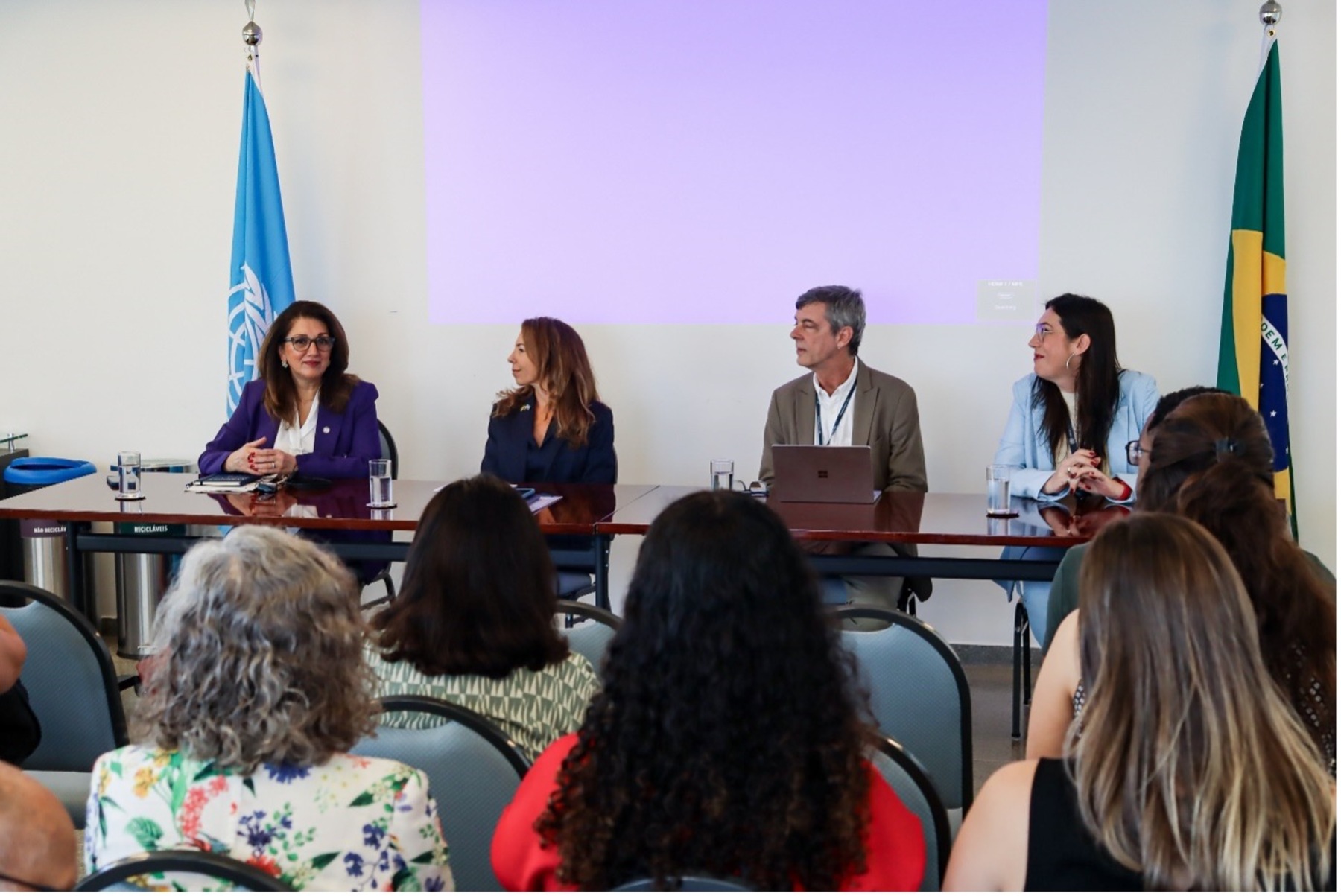Event highlights inequalities and access barriers in tackling HIV/AIDS, Tuberculosis, STIs, and Viral Hepatitis.

Image: Bruna Silva/ UNAIDS
On 18 November 2024, the United Nations Office on Drugs and Crime (UNODC) Brazil, in partnership with the Department of HIV/AIDS, Tuberculosis and Viral Hepatitis (DATHI) of the Ministry of Health (MS) and the Joint United Nations Programme on HIV/AIDS (UNAIDS), held a workshop at the United Nations headquarters in Brasilia. Entitled ‘Tackling HIV/AIDS, Tuberculosis, STIs and Viral Hepatitis among Women Who Use Drugs’, the event brought together relevant actors to address critical public health challenges, inequalities and difficulties in accessing services within the themes.
The workshop opened with speeches from leading figures, including FaribaSoltani, UNODC HIV/AIDS Section Chief and Global HIV/AIDS Coordinator, Elena Abbati, UNODC Brazil Representative, Ariadne Ribeiro, UNAIDS Equality and Rights Officer, and Dr DraurioBarreira, Director of DATHI/MS. DraurioBarreira, director of DATHI/MS, who highlighted the significant progress Brazil has made in raising public awareness about the importance of HIV/AIDS prevention, treatment and care policies, but that when it comes to people who use drugs, especially women, there are many stigmas and barriers that limit access to essential rights and services.
Fariba Soltani emphasised that UNODC's work in the area is aligned with global commitments, such as the 2019 Ministerial Declaration and the Sustainable Development Goals, especially SDG 3, which seeks to end AIDS by 2030. ‘Over the years, Brazil has been an exemplary leader in implementing rights-based responses to HIV for people who use drugs,’ said Fariba, highlighting how inclusive and evidence-based harm reduction policies can transform lives.
Discussions throughout the day centred on actionable strategies to integrate gender-sensitive and rights-based approaches into Brazil's National Plan to Combat HIV/AIDS and other STIs among women who use drugs and are vulnerable. Participants, including health managers, civil society representatives and international experts, engaged in dynamic sessions that addressed systemic barriers faced by vulnerable women, particularly those who use drugs. The workshop provided a platform for sharing best practices and generating recommendations aimed at strengthening equitable access to health services.
Elena Abbati highlighted the potential of this joint effort with the Ministry of Health, civil society organisations and experts as a catalyst in fulfilling UNODC's mandate to support policies and programmes aimed at HIV prevention and care for the most vulnerable populations, such as people who use drugs and those deprived of their liberty.
The latest UNODC World Drug Report, released in 2024, highlights that around one in five people who inject drugs are women, but women who inject drugs are 1.2 times more likely to live with HIV than men.
‘Promoting harm reduction and health services with a gender perspective is essential to putting women's human rights at the centre of the response,’ said Andrea BoccardiVidarte, director and representative of UNAIDS in Brazil.
According to the report ‘Let'scontinue on the path of rights’, launched by UNAIDS on 26 November, it is because of the impact of discrimination that the risk of contracting HIV is 14 times higher for people who inject drugs

Image: Bruna Silva/ UNAIDS
This workshop marked the beginning of a week-long mission to Brazil led by UNODC's HIV/AIDS Section, focusing on intersectoral collaboration and health promotion for people with HIV/AIDS who use drugs and people in prison, via harm reduction and human rights promotion strategies. Additional activities include field visits, workshops on gender-based violence for women and people who use drugs and bilateral meetings with key government partners, the National Secretariat for Drug Policy and Asset Management (SENAD) and the National Secretariat for Penal Policies (SENAPPEN), both of the Ministry of Justice and Public Security (MJSP), the international community and civil society.
HIV/AIDS and Drugs - UNODC's global HIV programme supports countries to achieve universal access to HIV prevention, treatment, care and support among people who use drugs and comprehensive HIV services for people deprived of their liberty in prisons.
UNODC's work is aligned with the Sustainable Development Goals (SDGs), especially SDG 3 and its target 3.3 to end AIDS by 2030, and with the UNAIDS Fast-Track Strategy 2016-2021, which calls for 90 per cent of people who inject drugs and people in prisons to have access to combined HIV prevention services. UNODC in Brazil works through the Project to Support the Implementation of the National System for the Prevention of Alcohol and Other Drug Use (SINAP), in partnership with the United Nations Development Programme (UNDP) and Senad/MJSP.